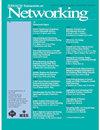A Privacy-Preserving Incentive Scheme for Data Sensing in App-Assisted Mobile Edge Crowdsensing
IF 3.6
3区 计算机科学
Q2 COMPUTER SCIENCE, HARDWARE & ARCHITECTURE
引用次数: 0
Abstract
Application (App)-assisted mobile edge crowd- sensing is a promising paradigm, in which Apps are in charge of tagging the location of the sensing tasks as point-of-interest (PoI) to assist the platform in recruiting users to participate in the sensing tasks. However, there exist potential security, incentive, and privacy threats for App-assisted mobile edge crowdsensing (AMECS) due to the presence of malicious Apps, the low-quality shared sensing data, and the vulnerability of wireless communication. Therefore, we propose a differential privacy-based incentive (DPI) scheme for AMECS to provide secure and efficient crowdsensing services while protecting users’ privacy. Specifically, we first propose an App quality management mechanism to correlate the behavior of each App with its quality and then select reliable Apps based on quality thresholds to assist the platform in recruiting users. With the designed mechanism, we further present an auction game-based incentive mechanism to encourage Apps to mark the location of the sensing tasks as PoI. To protect the privacy of users, a privacy-preserving sensing data sharing algorithm is devised based on differential privacy. Further, given the difficulty of obtaining accurate network parameters in practice, a reinforcement learning-based incentive mechanism is designed to encourage users to participate in sensing tasks. Finally, simulation results and security analysis demonstrate that the proposed scheme can effectively improve the utilities of users, ensure the security of the crowdsensing process, and protect the privacy of users.应用辅助移动边缘群体感知中数据感知的隐私保护激励方案
应用程序(App)辅助的移动边缘人群传感是一种很有前途的范例,其中应用程序负责将传感任务的位置标记为兴趣点(PoI),以协助平台招募用户参与传感任务。然而,由于恶意应用的存在、共享传感数据质量不高以及无线通信的脆弱性,应用辅助移动边缘众测(AMECS)存在潜在的安全、激励和隐私威胁。因此,我们为AMECS提出了一种差分隐私激励(DPI)方案,在保护用户隐私的同时提供安全高效的众感服务。具体而言,我们首先提出了一种App质量管理机制,将每个App的行为与其质量关联起来,然后根据质量阈值选择可靠的App,以辅助平台招募用户。根据设计的机制,我们进一步提出了一个基于拍卖游戏的激励机制,以鼓励应用程序将感知任务的位置标记为PoI。为了保护用户的隐私,设计了一种基于差分隐私的隐私保护感知数据共享算法。此外,考虑到在实践中难以获得准确的网络参数,设计了一种基于强化学习的激励机制来鼓励用户参与感知任务。最后,仿真结果和安全性分析表明,该方案能够有效提高用户的效用,保证众感过程的安全性,保护用户的隐私。
本文章由计算机程序翻译,如有差异,请以英文原文为准。
求助全文
约1分钟内获得全文
求助全文
来源期刊

IEEE/ACM Transactions on Networking
工程技术-电信学
CiteScore
8.20
自引率
5.40%
发文量
246
审稿时长
4-8 weeks
期刊介绍:
The IEEE/ACM Transactions on Networking’s high-level objective is to publish high-quality, original research results derived from theoretical or experimental exploration of the area of communication/computer networking, covering all sorts of information transport networks over all sorts of physical layer technologies, both wireline (all kinds of guided media: e.g., copper, optical) and wireless (e.g., radio-frequency, acoustic (e.g., underwater), infra-red), or hybrids of these. The journal welcomes applied contributions reporting on novel experiences and experiments with actual systems.
 求助内容:
求助内容: 应助结果提醒方式:
应助结果提醒方式:


